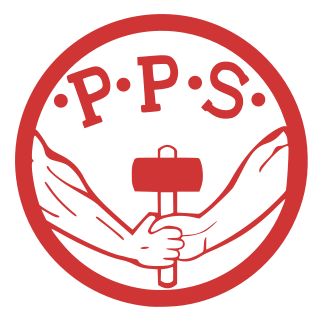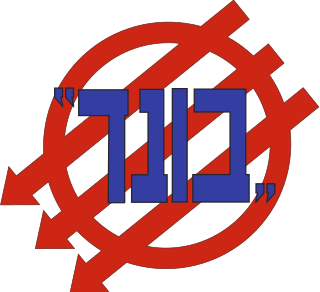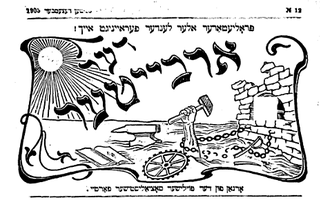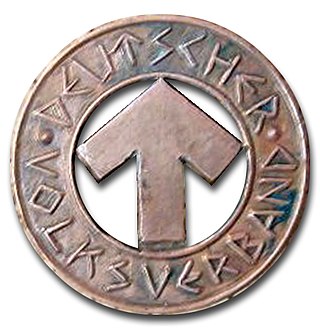Related Research Articles

Grudziądz is a city in northern Poland, with 92,552 inhabitants (2021). Located on the Vistula River, it lies within the Kuyavian-Pomeranian Voivodeship and is the fourth-largest city in its province. The Old Town of Grudziądz and 14th-century granaries were declared National Historic Monuments of Poland.
The interwar Communist Party of Poland was a communist party active in Poland during the Second Polish Republic. It resulted from a December 1918 merger of the Social Democracy of the Kingdom of Poland and Lithuania (SDKPiL) and the Polish Socialist Party – Left into the Communist Workers' Party of Poland. The communists were a small force in Polish politics.

The Polish Socialist Party is a democratic socialist political party in Poland.

The Social Democracy of the Kingdom of Poland and Lithuania, originally the Social Democracy of the Kingdom of Poland (SDKP), was a Marxist political party founded in 1893 and later served as an autonomous section of the Russian Social Democratic Labour Party. It later merged into the Communist Workers Party of Poland. Its most famous member was Rosa Luxemburg.

The Łódź insurrection, also known as the June Days, was an uprising by Polish workers in Łódź against the Russian Empire between 21 and 25 June 1905. This event was one of the largest disturbances in the Russian-controlled Congress Poland during the Russian Revolution of 1905. Poland was a major center of revolutionary fighting in the Russian Empire in 1905–1907, and the Łódź insurrection was a key incident in those events.
DAP or Dap may refer to:
The German Socialist Labour Party in Poland – Left was a political party in the Second Polish Republic. The party was founded on October 3, 1930, as a leftist split from the German Socialist Labour Party of Poland (DSAP) in Łódź.
The Silesian Socialist Party was a political party in Silesia, Poland. The party was founded on May 1, 1928, by Józef Biniszkiewicz. When the new party was founded, it took over the regional PPS organ Robotnik Śląski.
German Social Democratic Party was a political party in Poland, founded on March 26, 1922.
Kattowitzer Volkswille, generally called just Volkswille, was a German-language Social Democratic newspaper published from Kattowitz. The newspaper was founded in 1916 by the Social Democratic Party of Germany (SPD) politician Otto Braun. Initially, the newspaper carried the devise 'Upper Silesian Free Press - Organ of the Upper Silesia Agitation District of the Social Democratic Party of Germany'.
Siegmund Glücksmann was a German-Jewish socialist politician. In the 1920s and 1930s, he was one of the most prominent figures of the German minority socialist movement in Poland, functioned as its 'party ideologue' and represented the more Marxist oriented wing of the movement.
The German Socialist Labour Party of Poland was a political party organizing German Social Democrats in interbellum Poland.

The General Jewish Labour Bund in Poland was a Jewish socialist party in Poland which promoted the political, cultural and social autonomy of Jewish workers, sought to combat antisemitism and was generally opposed to Zionism.

Der arbeyter was a Yiddish-language newspaper, issued by the Polish Socialist Party (PPS). The newspaper was launched in 1898, named after a Galician Jewish social democratic publication by the same name. Der arbeyter was initially published from London.
Bund für Arbeiterbildung was a German educational organization in interbellum Poland. It was the educational association of the German Socialist Labour Party in Poland (DSAP). The organization had around 6,000 members. The organization took part in publishing the monthly Der Oberschlesier as a joint organ together with Oberschlesischer Kulturverband and Verband der katholischen Vereine Oberschlesiens.

Deutscher Volksverband in Polen (DVV), or the German People's Union in Poland, was a Nazi German extreme right-wing political party founded in 1924 in central Poland by members of the ethnic German minority who did not wish to join the minority bloc in the Polish parliament Sejm. DVV was headed by August Utta, and financially supported by the Reich Ministry of Finance. Deutscher Volksverband was most active in the Łódź and Tomaszów area.

The General Jewish Labour Bund in Lithuania, Poland and Russia, generally called The Bund or the Jewish Labour Bund, was a secular Jewish socialist party initially formed in the Russian Empire and active between 1897 and 1920. In 1917, the Bund organizations in Poland seceded from the Russian Bund and created a new Polish General Jewish Labour Bund which continued to operate in Poland in the years between the two world wars. The majority faction of the Russian Bund was dissolved in 1921 and incorporated into the Communist Party. Other remnants of the Bund endured in various countries. A member of the Bund was called a Bundist.
Karl Buchwald was a German politician and trade unionist.

Jungdeutsche Partei in Polen (JDP), or the Young German Party in Poland, was a Nazi German extreme right-wing political party founded in 1931 by members of the ethnic German minority residing in the Second Polish Republic.

Elections to the Łódź City Council were held in January 1917, under German occupation and in the midst of World War I. The elections were organized by the German occupation authorities who applied an electoral system of unequal curiae. The election produced a City Council in which neither the Polish nor Jewish blocs held majority, with the German councilors tipping the balance. According to Hofmann (2021) "the election campaign called forth a plethora of political groups that corresponded to the complex social, ethnic, and confessional divisions of the city", aggravating urban tensions in Łódź.
References
- 1 2 3 4 5 Veröffentlichungen der Ostdeutschen Forschungsstelle im Lande Nord-Westfalen. Ostdeutsche Forschungsstelle im Lande Nordrhein-Westfalen. 1969. pp. 80, 82.
- 1 2 3 Petra Blachetta-Madajczyk (1997). Klassenkampf oder Nation?: deutsche Sozialdemokratie in Polen 1918-1939. Droste. pp. 117, 291. ISBN 978-3-7700-1602-0.
- ↑ Polish Western Affairs. Instytut Zachodni. 1991. p. 22.
- ↑ Elvira Grözinger; Andreas Lawaty (1986). Suche die Meinung: Karl Dedecius, dem Übersetzer und Mittler zum 65. Geburtstag. O. Harrassowitz. p. 218. ISBN 978-3-447-02630-7.
- 1 2 3 4 Winson Chu (25 June 2012). The German Minority in Interwar Poland. Cambridge University Press. pp. 127–129. ISBN 978-1-107-00830-4.
- ↑ Winson W. Chu (2006). German Political Organizations and Regional Particularisms in Interwar Poland (1918-1939). University of California, Berkeley. p. 215.
- 1 2 3 Beata Dorota Lakeberg (2010). Die deutsche Minderheitenpresse in Polen 1918-1939 und ihr Polen- und Judenbild. Peter Lang. p. 42. ISBN 978-3-631-60048-1.